Virtual Forestry Workshops: Online Learning for Landowners
- August 28, 2024
- 0 comment
Virtual forestry workshops provide a convenient and effective way for landowners to acquire the knowledge needed for sustainable forest management. These online programs are designed to offer practical insights and tools that can be applied directly to managing forested properties.

Several key virtual workshops are available, each tailored to support landowners in achieving their forest management goals while overcoming the limitations of traditional, in-person sessions.
List of Virtual Forestry Workshops
1. Virginia Forest Landowner Education Program: Online Woodland Options for Landowners
The Virginia Forest Landowner Education Program offers a 10-week “Online Woodland Options for Landowners” course starting in July 2024. This self-paced course helps both new and experienced landowners gain a deeper understanding of forest management, stewardship, and sustainability.
Duration: 10-week program starting in July 2024.
Course Type: Self-paced.
Target Audience: New and experienced landowners.
Participants learn to set management goals, understand forest ecology, and use tools like Google Earth, culminating in the creation of a practical forest management plan by the program’s end.
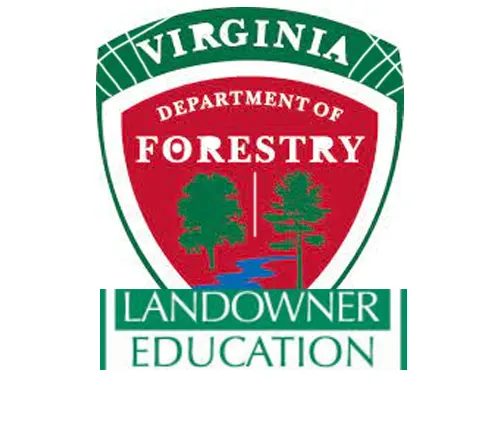
Key Topics:
- Forest management fundamentals
- Stewardship and sustainability
- Setting management goals
- Understanding forest ecology
- Utilizing maps and tools like Google Earth
The course is divided into two participation levels: a basic level, which includes quizzes and evaluations, and an advanced level, which incorporates field activities. This flexibility allows participants to choose the level of engagement that best fits their needs and schedule.
For landowners looking to gain a solid foundation in forest management without leaving home, this course offers a convenient and effective solution.
2. Forest Landowner Academy (University of Florida)
The Forest Landowner Academy, offered by the University of Florida, is a self-paced, online course ideal for those new to forestry or land management. It provides a comprehensive primer on forest management through seven modules, covering topics like timber management, wildlife habitat, and future planning.
Course Type: Self-paced, online course.
Modules: Seven modules covering key forestry aspects.
Certification: University of Florida Certificate of Completion upon finishing.
Participants will learn to develop and implement management plans, market forest products, and explore forest enterprises, making it a robust platform for improving forest stewardship.
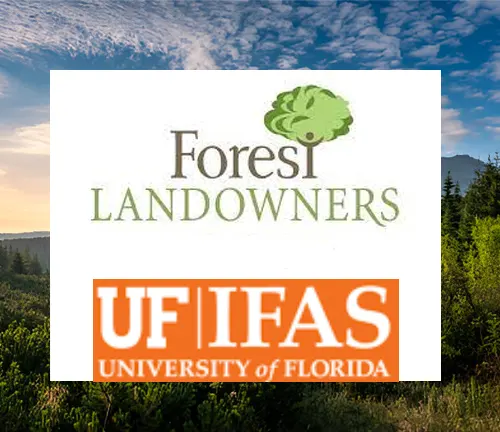
Key Topics:
- Timber management
- Wildlife habitat management
- Planning for the future
- Marketing forest products
- Exploring forest enterprises like pine straw and hunting leases
One of the standout features of the Forest Landowner Academy is its certification. Upon completing the course, participants receive a University of Florida Certificate of Completion, which not only validates their knowledge but also enhances their credibility as responsible forest stewards.
For those looking to combine convenience with comprehensive education, the Forest Landowner Academy is an invaluable resource.
3. Washington State University Extension Forestry: Online Coached Planning Course
Washington State University (WSU) Extension Forestry offers the “Summer 2024 Intensive Online Coached Planning Course,” starting on July 8, 2024, to help landowners create personalized Forest Stewardship Plans.
Course Type: Intensive Online Coached Planning Course.
Start Date: July 8, 2024.
The course is ideal for those seeking a proactive approach to forest management, covering tree health assessment, wildlife attraction, and pest prevention. With a focus on practical, hands-on learning, participants can take actionable steps to achieve their long-term forest management goals.
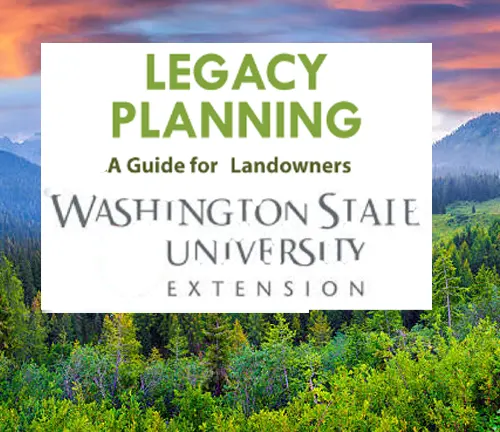
Key Topics:
- Assessing tree health
- Attracting wildlife
- Preventing insect and disease problems
One of the significant benefits of completing this course is the potential for state recognition as a Stewardship Forest. This designation not only acknowledges the landowner’s commitment to sustainable management but may also help them qualify for property tax reductions and conservation cost-share grants.
For landowners seeking to improve their forest management practices while gaining recognition and financial benefits, WSU’s Online Coached Planning Course is an excellent choice.
4. WSU Extension Forestry Webinars
WSU Extension Forestry offers live webinars on topics like forest stewardship, wildfire management, and sustainable forestry practices, providing real-time learning opportunities from experts.
These webinars are free and accessible, with pre-registration allowing participants to receive links to recorded sessions if they miss the live event. This ensures that landowners can stay informed on best practices, regardless of their schedules.
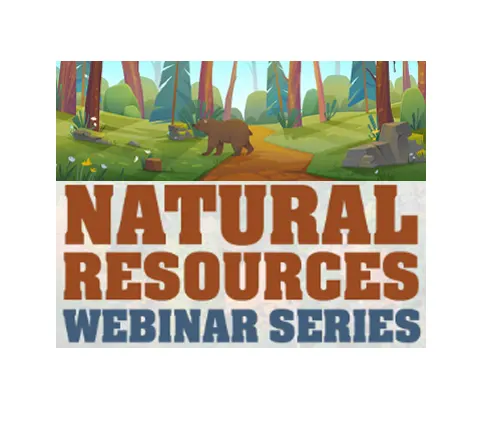
Key Topics:
- Forest stewardship
- Wildfire management
- Sustainable forestry practices
For those who prefer on-demand learning, WSU also provides access to a library of recorded webinars. This resource allows landowners to explore topics of interest at their own pace, ensuring that they can find the information they need when it is most relevant to them.
Whether it’s learning about forest health, preparing for wildfire risks, or enhancing biodiversity, these webinars are a valuable tool for ongoing education.
5. Virginia SHARP Logger Online Training
The Virginia SHARP Logger Online Training program offers free courses beneficial to both logging professionals and landowners, covering topics like water quality, chainsaw safety, forestry laws, and best management practices.
These courses benefit landowners managing logging operations by providing guidance on sustainable practices and responsible logging. This helps protect forest resources while enhancing economic returns.
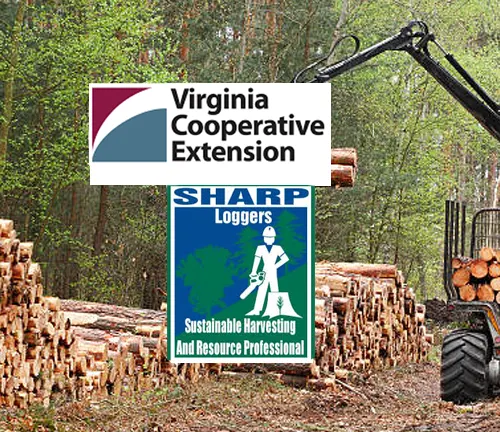
Key Topics:
- Water quality
- Chainsaw safety
- Forestry laws
- Best management practices
For landowners looking to enhance their knowledge of forestry operations and ensure compliance with environmental regulations, the Virginia SHARP Logger Online Training is an excellent resource. Its focus on safety and sustainability aligns with broader conservation goals, making it a valuable addition to any landowner’s educational toolkit.
Benefits of Virtual Learning for Landowners
Virtual learning provides several key benefits for landowners who want to enhance their forest management practices while accommodating busy schedules or remote locations. It offers flexibility to learn at their own pace and access to valuable resources, such as recorded sessions and materials that can be revisited as needed.
Benefits of Virtual Learning for Landowners:
- Flexibility: Virtual workshops allow landowners to learn at their own pace, which is ideal for those with busy schedules or other commitments. This flexibility ensures that they can balance forest management education with their day-to-day responsibilities.
- Accessibility: These workshops are accessible from anywhere, making them perfect for landowners who live in remote areas or far from educational centers. By eliminating the need for travel, virtual workshops reduce barriers to education.
- Resource Availability: Participants have access to recorded sessions and additional materials, which they can revisit whenever needed. This ongoing availability allows landowners to reinforce their learning and apply it to real-world situations.
- Networking Opportunities: Virtual learning connects landowners with experts and peers, facilitating valuable knowledge exchange. This interaction helps landowners gain insights from a broader community, enhancing their management strategies.
- Comprehensive Support: The expanded access to information and expert guidance through virtual workshops helps landowners implement more effective and innovative management strategies. This support is crucial for making informed decisions that lead to better stewardship of their forests.
Conclusion
Virtual forestry workshops provide landowners with essential resources to improve forest management through flexibility, convenience, and expert guidance. Courses like those from the Virginia Forest Landowner Education Program and the Forest Landowner Academy equip participants with the skills needed for sustainable forestry.
These programs offer valuable knowledge for both new and experienced landowners, leading to healthier forests, better biodiversity, and stronger economic outcomes. As virtual learning continues to evolve, these workshops will increasingly empower landowners to make informed, sustainable decisions.
Frequently Asked Questions (FAQ’s)
- What are virtual forestry workshops?
Virtual forestry workshops are online courses, webinars, or training sessions designed to educate landowners on forest management practices. These workshops offer flexible, self-paced learning opportunities that can be accessed from anywhere, making them ideal for busy or remote landowners. - Who should attend virtual forestry workshops?
Virtual forestry workshops are ideal for landowners, forestry professionals, and anyone interested in learning about sustainable forest management. They are particularly beneficial for those who cannot attend in-person workshops due to time constraints or geographical limitations. - What topics are covered in virtual forestry workshops?
Topics commonly covered include forest management planning, timber management, wildlife habitat, conservation practices, and legal considerations in forestry. Some workshops also address specific issues like wildfire management, invasive species, and water quality. - Are virtual forestry workshops self-paced?
Many virtual forestry workshops are self-paced, allowing participants to complete the course at their own convenience. This flexibility is especially helpful for landowners with busy schedules or those who manage large properties. - Do virtual forestry workshops offer certifications?
Some virtual workshops, like the Forest Landowner Academy by the University of Florida, offer certifications upon completion. These certifications can enhance a landowner’s credibility and demonstrate their commitment to responsible forest management. - How do virtual forestry workshops benefit landowners?
Virtual forestry workshops provide landowners with practical knowledge and tools to manage their forests sustainably, protect resources, and potentially increase property value. They also offer networking opportunities with experts and other landowners. - What are some examples of virtual forestry workshops?
Examples include the Virginia Forest Landowner Education Program’s Online Woodland Options for Landowners, the University of Florida’s Forest Landowner Academy, and Washington State University’s Online Coached Planning Course. Each program offers tailored content to meet the needs of different landowners. - Can virtual forestry workshops help with legal and regulatory compliance?
Yes, many virtual workshops cover legal aspects of forestry, such as conservation easements, forestry laws, and best management practices. Understanding these regulations is crucial for landowners to avoid fines and ensure compliance with state and federal laws. - What resources are typically provided in virtual forestry workshops?
Participants often receive access to recorded sessions, downloadable materials, management tools, and sometimes one-on-one coaching. These resources can be revisited as needed, providing ongoing support beyond the workshop itself. - Are there any costs associated with virtual forestry workshops?
While some virtual workshops are free, others may have an enrollment fee. The cost often depends on the depth of the course content, certification opportunities, and additional resources provided.

Jordan Blake
Forestry AuthorJordan Blake is a forestry expert with over 15 years of experience in arboriculture and community education. Passionate about sustainable forest management, Jordan regularly writes for Forestry.com and Tree Care Magazine. Holding certifications in tree health assessments and urban forestry management, Jordan conducts workshops to educate the public on sustainable practices. Jordan has a degree in Environmental Science and enjoys hiking and photography in their free time.

Leave your comment